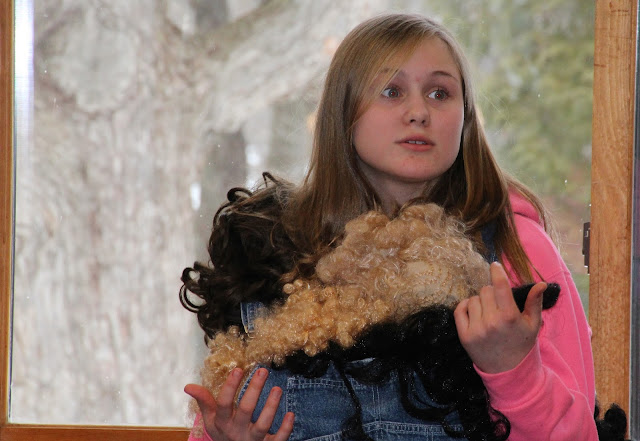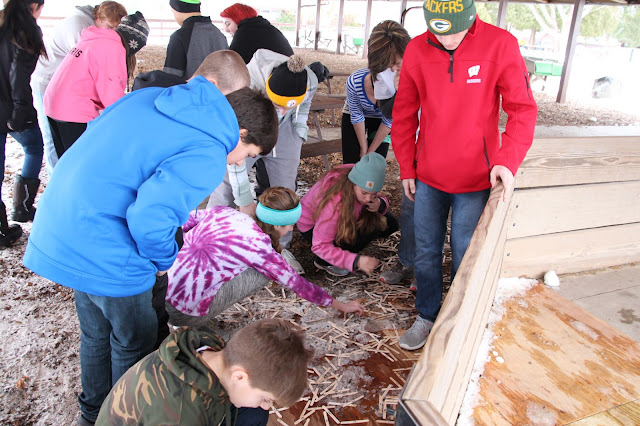KARCHER STAFF BLOG
No students of the week for this past week due to ODE...
______________________________________________________________________________
Kudos
_____________________________________________________________________________________________________
- THANK YOU to our 8th grade staff, Trent Tonn, Jake Malewicki, Barb Berezowitz, Rose Dolatowski, Erika Fons, Wynne Slusar, Crysta Hernandez, Misty Graham (French) and the volunteer students for assisting with Outdoor Education. With this being my first ODE experience I was very impressed with the organization and opportunities provided to our students. Great job everyone! Pictures from ODE are below...
- THANK YOU Patti Tenhagen, Jack Schmidt, and Alyssa Riggs for providing a week worth of character curriculum for our 7th grade advisory students. The curriculum involved bullying and time to upload materials into their student portfolios.
- THANK YOU to Mike Yopp and all of our applied academic teachers for providing a great experience for our 8th grade students that did not attend ODE. Students enjoyed all the activities and the opportunity to go bowling.
______________________________________________________________________________
Reminders
__________________________________________________________________________________________________________________________
- Huddle Time this week with an extended advisory.
- Continuation of MAP Testing this week.
- January 11th Staff Meeting will be to discuss our upcoming new Character Assemblies.
- January 13th PLC is the next literacy lesson taught by Molly, Patti, and Jenny - Questioning/Visualizing.
- January 18th - BLT Meeting
- January 20th is a KCB day... students can wear a hat all day to school by using 2 KCBs. Matt will send out more details for the systemic end of things to you prior to January 20th.
- January 26th is the end of the quarter. Please continue to encourage students to utilize Thursday school prior to the end of the semester.
- January 27th is an all day in-service and an 8-4 work day.
- The morning will start at BHS in the auditorium for the longevity awards from 8:00 to 9:00.
- We will then be back at Karcher from 9:00 to 11:30 as building level in-service. The majority of this time will be dedicated to standards/common assessment PLC work to give you a longer period of time to work. However, we will start in the Karcher library at 9:00 or when we are dismissed from the auditorium to return to our buildings.
- 11:30 to 12:30 for lunch.
- 2:30 - 4:00 is for grading and classroom work time to finish up semester 1 and get ready for semester 2.
______________________________________________________________________________
Pictures from the week
Article of the week: Continuation of last week's article. Next week will be as well - I thought breaking up the articles would be nicer for everyone :)



Chapter 1. Learning, or Not Learning, in School
Better Learning Through Structured Teaching: A Framework for the Gradual Release of Responsibility, 2nd Edition
Independent Learning
The ultimate goal of instruction is that students be able to independently apply information, ideas, content, skills, and strategies in unique situations. We want to create learners who are not dependent on others for information and ideas. As such, students need practice completing independent tasks and learning from those tasks. Overall and across time, the school and instructional events must be "organized to encourage and support a continued, increasingly mature and comprehensive acceptance of responsibilities for one's own learning" (Kesten, 1987, p. 15). The effectiveness of independent learning, however, depends on students' readiness to engage in it; too many students are asked to complete independent tasks without having received the focused or guided instruction they need.
When students are ready to apply skills and knowledge to produce new products, there is a range of independent tasks that might be used. Our experience suggests that the more authentic a task is, the more likely the student is to complete it. For example, a kindergarten teacher might ask a student to read a familiar book to three adults, a 6th grade science teacher might ask a student to predict the outcome of a lab based on the previous three experiments, and a high school art teacher might ask a student to incorporate light and perspective into a new painting. What's essential is that an independent learning task clearly relate to the instruction each student has received and yet also provide the student an opportunity to apply the resulting knowledge in a new way.
When Learning Isn't Occurring
With this structure for instruction that works fresh in mind, let's look at some structures that don't work so well. Unfortunately, there are still plenty of classrooms in which responsibility for learning is not being transferred from knowledgeable others (teachers, peers, parents) to students. Although they may feature some of the phases of instruction we have described, the omission of other phases derails learning in significant ways.
For example, in some classrooms, teachers provide modeling and then skip straight to asking students to complete independent tasks—an approach graphically represented in Figure 1.2.
Figure 1.2. In Some Classrooms …
This instructional model is very familiar. A teacher demonstrates how to solve algebra problems and then asks students to solve the odd-numbered problems in the back of the book. A teacher reads a text aloud and then asks students to complete a comprehension worksheet based on the reading. In both cases, the teacher fails to develop students' understanding of the content through the purposeful interaction of guided instruction.
Sadly, there is a classroom model even worse than this, at least in terms of instructional development. It's the one in which students are asked to learn everything on their own, depicted in Figure 1.3.
Figure 1.3. In Some Classrooms …
The structure of these classes is depressingly uniform. Students complete the prepared study packet of photocopied worksheets, or they read the assigned pages and then answer the questions at the back of the textbook—and they follow this pattern over and over again, day after day. There really isn't much teaching going on in these classrooms; it's mostly assigning or causing work. Frankly, we'd be embarrassed to cash our paychecks if we "taught" like this.
There are days at school when students do need to spend significant amounts of time working independently—completing projects, writing essays, and the like. However, this should not be happening every day, and on the days it does happen, students need to be reminded of the purpose of the lesson, experience a brief episode of expert thinking, and interact with their peers.
Even in classrooms that most people would consider "good" or "good enough," the gradual release of responsibility instructional framework is seldom fully operationalized. As noted, the most frequent omission is the collaborative learning phase, leading to the instructional approach represented in Figure 1.4.
Figure 1.4. In Some Classrooms …
In these classrooms, the teacher provides modeling and then meets with small groups of students. But students don't have the opportunity to collaborate, as they are all required to complete independent tasks while waiting their turn to meet with the teacher. For example, the teacher might model comprehension strategies useful in understanding scientific texts (I do it) and then meet with two or three small groups of students to guide their understanding (We do it together). As this is going on, the rest of the students are more likely to be assigned independent reading from a textbook (You do it) than they are to work in collaborative learning groups (You do it together).
We believe that all four phases of the gradual release of responsibility framework—focused instruction, guided instruction, collaborative learning, and independent learning—are necessary if we want students to learn deeply, think critically and creatively, and be able to mobilize learning strategies. But we didn't always understand this. Our teaching histories are replete with all of the ineffective models of instruction that we've just described.













































































